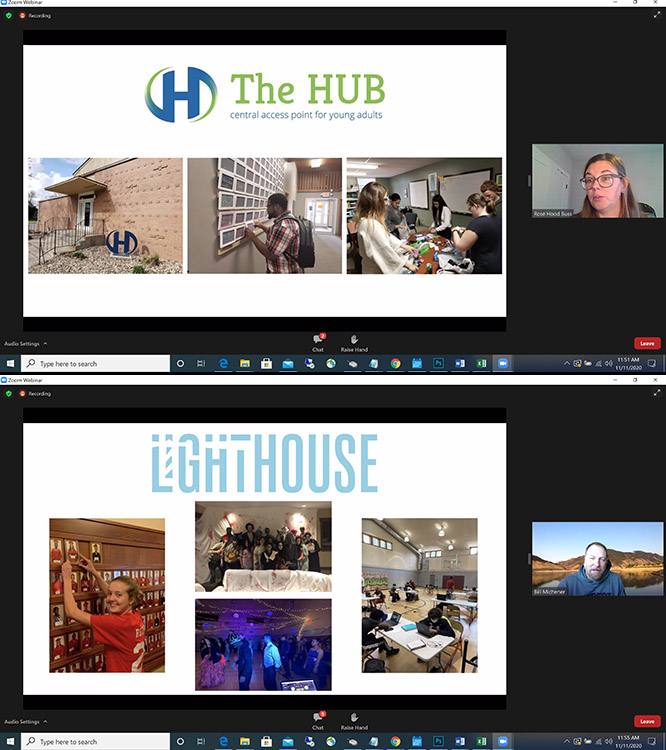The challenges of awarding monies to deserving nonprofits through the grant application process can be daunting under the best circumstances. When demands of COVID-19 forced the process online, business students in the Strive to Thrive Lincoln project grew their engagement and earned the accolades of recipients for how they handled efforts to award two $5,000 grants.
Classmates in the Leading People and Projects (MNGT 411) course awarded grants to The HUB Central Access Point for Young Adults and Lighthouse, two Lincoln, Nebraska, nonprofits whose work supports educational engagement with at-risk youth and young adults. Students evaluate applicants to determine who best merits the grants based on class mission directives. Local philanthropist Rhonda Seacrest and Doris Buffett’s Learning By Giving Foundation provided the $10,000 to support the class project.
“Each student on our site visit at Lighthouse collaborated to learn more about our programs,” said Bill Michener, executive director, who was a first-time recipient of Strive to Thrive Lincoln, after applying previously. “In the past we usually see one or two students asking questions, but I was impressed in our virtual site visit that each student really engaged us. We stayed on the call for an hour, and I appreciated it because I could give them a better picture of what we’re about.”
After the pandemic hit, Lighthouse took a step back to evaluate how they could continue delivering educational services to young people. According to Michener, an increase in online learning for high school students led to a dramatic increase in academic failures. They decided to respond by helping students receive more direct assistance and guidance at Lighthouse. Staff now operate day-long support programs, as well as after-school programs, which the grant money will support.
 Rose Hood-Buss, executive director of The Hub, and Bill Michener, executive director of Lighthouse, each accepted their $5,000 grants from Strive to Thrive Lincoln on a virtual ceremony facilitated by business students.
Rose Hood-Buss, executive director of The Hub, and Bill Michener, executive director of Lighthouse, each accepted their $5,000 grants from Strive to Thrive Lincoln on a virtual ceremony facilitated by business students.
Rose Hood-Buss, executive director at The HUB, experienced similar engagement with Strive to Thrive Lincoln students during her organization’s virtual site visit.
“This class really wanted to dig in and understand what was facing the young adults we serve and how we’re addressing their needs,” said Hood-Buss, whose organization was also a previous applicant but first-time recipient. “Our needs have been exacerbated by the pandemic, so this was really exciting because we are a smaller nonprofit and $5,000 makes a big impact for us.”
Early in the semester, students also did service projects with The HUB – one of eight organizations students helped directly as part of their work to get a better understanding of community needs.
“I think that helped students be more connected to what we do. These students are in the same age range of the young people we serve, so when they had that opportunity to serve, it gave them insight into our mission and how that connected with the class. It showed in the interview process when they really put the pieces together to understand how we serve,” she said.
The HUB helps educate, employ and empower young adults looking to get their high school degree or GED, transition into the workforce and receive encouragement and support to build self-sufficiency.
Jackson Schiefelbein, a senior management major from Topeka, Kansas, worked on The HUB service project. In past classes, students usually performed in-person physical tasks such as helping to stock donations at the Food Bank. This year required a bit more ingenuity to assist nonprofits.
“Our service project researched other organizations outside Nebraska offering similar services as The HUB, such as those providing affordable housing or access to meals,” said Schiefelbein. “Rose gave us guidelines and then our team researched many states and compiled a lengthy list of available resources. It will be used when young adults who use The HUB services move to another state whether they’re aging out of foster care or need to move for better opportunities elsewhere.”
Schiefelbein also led class deliberations when it came to selecting the grant awardees. Because students had been extra diligent on their 12 site visits, it created enormous competition when trying to determine the two most deserving nonprofits to fund.
“Our main focus was how to provide an unbiased way to rank these nonprofits amidst a lot of emotions from classmates advocating for different organizations,” said Schiefelbein. “You would love to see your nonprofit win, but it was my job to keep our main focus on the three aspects of our mission statement. Did the organization reach an intersectional population? Does the organization provide educational opportunities in the community? And is it a sustainable organization?”
Ultimately, the class consciousness determined The HUB and Lighthouse best met mission statement objectives. An award ceremony, also conducted online, concluded the application process by formally awarding the grants.
Dr. Kathy Farrell, James Jr. and Susan Stuart Endowed Dean of the College of Business, attended the online ceremony. She praised students’ dedication to seeing the project through using a virtual format.
“I am also grateful for the nonprofit organizations’ collaboration as we transitioned the experience to a new platform,” said Farrell. “Together, you have written a new chapter in the story of this unique learning opportunity. In our current situation, supporting our neighbors is more important than ever. Our success as a community is not based solely on individual success. While we must write our own stories, I challenge everyone – students, business community members and volunteers – to continue asking questions about how to collaborate and cultivate innovative relationships that best impact our community.”
To learn more about the Strive to Thrive Lincoln project, visit: https://business.unl.edu/strivetothrive/.
To learn more about the Department of Management, visit: https://business.unl.edu/management/.
Published: November 17, 2020